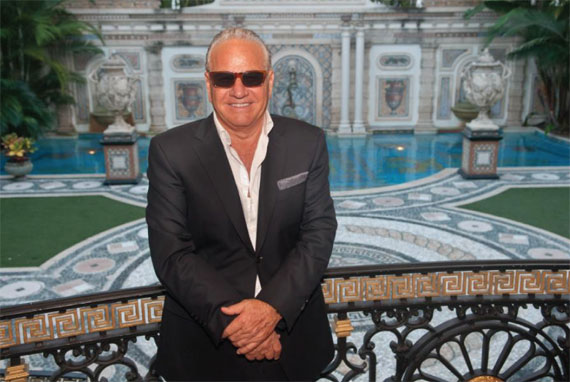Near the entrance to the Flea Market USA, a dilapidated food truck sells fried chicken, hot dogs, hamburgers and French fries to customers streaming in and out of the 215,000-square-foot shopping center in Miami’s Liberty City neighborhood, where the median household income is $26,364. Inside, dozens of merchants peddle discounted shoes and clothes, jewelry, booming car stereo systems and barber services.
The 14-acre Flea Market USA, at 3017 Northwest 27th Street, was among the first properties in Miami acquired by the Nakash family, the founders of Jordache Jeans who made their first big local splash with the 2013 purchase of the former Versace Mansion, and made major waves again with the nearly $90 million purchase of The Setai Hotel in December.
While Flea Market USA may seem like an odd fit in the Nakash family’s growing empire of South Beach hotels, the property is indicative of the family’s strategy: Carry a diverse array of holdings in just about every real estate sector.
“That one is a little bit unusual,” said Jonathan Bennett, director of real estate for Nakash Holdings and the de facto family spokesperson on such matters (the family declined to be interviewed for this story). “It’s a little bit different from the strategy on Miami Beach, but it is a compelling investment opportunity for us.”
Whether it’s owning income-producing shopping centers in depressed neighborhoods, or luxury condo hotels in oceanfront communities, Nakash’s goal is to hold onto valuable real estate in perpetuity, Bennett said. “We have a very, very long-term view,” he explained. “Whatever happens in the market on a short-term basis, we try to manage around it. Our holding period is 1,000 years.”
Over the last three decades, Nakash Holdings — the investment arm of the family’s global conglomerate Jordache Enterprises, founded by siblings Joseph, Avi and Ralph Nakash — has amassed a portfolio of 14 hotels, 12 residential buildings, seven shopping centers and dozens of retail storefronts in Tel Aviv, Miami, New York City, Los Angeles and a handful of other U.S. cities.
Porsche Tower developer Gil Dezer, who hobnobbed with the Nakashes at the Formula 1 Abu Dhabi Grand Prix in November, said the family has been sitting on a lot of cash generated by the success of their denim empire. “That’s a great position to be in,” Dezer said. “They are really sharp guys who know business. That’s why they are major players around the world.”
It all began with the jeans. In the 1960s, the Nakash brothers immigrated to New York City from Israel. In 1968, they cobbled together $20,000 and formed a partnership to sell dungarees in a Brooklyn storefront. The name Jordache is an amalgam of the siblings’ first names, the name of Ralph’s first son and their last name. By 1977, Jordache had expanded into manufacturing, making designer jeans that competed against labels like Calvin Klein and Gloria Vanderbilt.
In 1984, the Nakashes bought a 51 percent stake in jeans maker Guess for $15 million. But the partnership didn’t last. The Marciano brothers, founders of Guess, accused the Nakashes of buying into their company to steal their ideas. In 1989, a California Superior Court jury sided with the Marciano brothers’ claim that the Nakashes had fraudulently lured them into a deal. The Nakashes paid an undisclosed settlement and returned their stake to the Marcianos. Bennett said he couldn’t comment because the litigation took place more than a decade before he joined the company.
Jordache continues to manufacture denim and, according to the company website, makes 35 million jeans a year in factories around the world. But prolific pants production was not enough for the Nakash family. They own the Port of Eilat in Israel as well as their own commercial airline, Arkia, and run an executive charter jet company called Excel Aire, among other business ventures. And then there is their long-standing involvement in real estate.
The family jumped into Miami’s commercial real estate market in 2005, two years after Joseph purchased a three-bedroom villa on tony Fisher Island for $1.1 million. They purchased the 27-room Hotel Ocean at 1236 Ocean Drive in Miami Beach for $15.1 million, and the retail ground floor of an Art Deco building at 750 Collins Avenue for $6.1 million.
The same year, the family partnered with New York City developer Haim Chera to buy Flea Market USA — identified as Miami Merchants Mart on the Jordache corporate website — for $11 million. According to Bennett, the Nakash brothers and Chera found out that Walmart, Jordache’s biggest client, was scouting locations in Liberty City to open a super center. (The retail giant just opened its new 182,000-square-foot store at 3200 Northwest 79th Street in January). Investing in Flea Market USA was a long-term play.
“It’s a cash-flow producing property that has been functioning for many years,” Bennett said. “Walmart creates a critical mass that has a halo effect on neighboring properties.”
Ultimately, Flea Market USA could be redeveloped into a modern shopping center, anchored by another big box retailer and national credit tenants, Bennett said. However, the Nakashes are primarily focused on being major players in Miami Beach’s hotel market, he insisted.
“South Beach, particularly Ocean Drive, fits perfectly into our model,” Bennett said. “Some people have thought Ocean Drive has lost some of its allure. But if you are a first-time visitor to Miami and you tell the cab driver where you want to go, nine out of 10 times, the answer is Ocean Drive.”
After scooping up Hotel Ocean and the retail space at 750 Collins, a flurry of similar transactions took place over the following years, ranging from the 2007 purchase of the Hotel Henrosa at 1435 Collins Avenue to the $18.3 million purchase in 2012 of the ground retail floor at the Strand at 1052 Ocean Drive.
But despite the volume of purchasing, the Nakashes maintained a low-key profile during that time, according to Michael Capponi, a pioneer of Miami Beach’s nightlife industry who is now a real estate developer.
“The Nakash family has been active in the market here for many years, somewhat under the radar,” Capponi said. “They are opportunistic and value buyers who know how to take under-performing assets and at once increase productivity and reduce costs.”
It was not until September 2013, when they outbid Donald Trump and Palm Beach Polo owner Glenn Straub to win the former Versace mansion for $41.5 million in a bankruptcy auction, that the Nakashes formally established themselves as a major force in Miami Beach, Capponi said.
“The Versace mansion is truly a trophy property,” he said. “Without a doubt, they will be successful here in repositioning it.”
With their acquisition of The Setai for nearly $90 million, days before Christmas 2014, the Nakashes are in a prime spot to compete with the nearby W Hotel, the SLS South Beach, the recently opened Miami Beach EDITION and Faena House, which is set to open later this year, said Jill Hertzberg, who, along with her partner Jill Eber, brokered the Versace mansion sale.
“I think their whole family dynamic is the key to their business ,” she said. “They are all devoted to making their brand stronger, and I think they will find success in Miami.”

